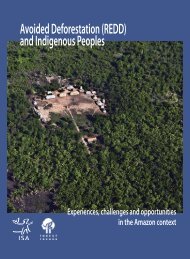BASELINE STUDY 5, Thailand - Forest Trends
BASELINE STUDY 5, Thailand - Forest Trends
BASELINE STUDY 5, Thailand - Forest Trends
You also want an ePaper? Increase the reach of your titles
YUMPU automatically turns print PDFs into web optimized ePapers that Google loves.
7. CERTIFICATION AND VERIFICATION SYSTEMS<br />
To date, the Royal Thai Government has been slow to institute programs to respond to the demand for certified<br />
wood products from major export markets. Many different government agencies are engaging on forest<br />
legality issues, and not necessarily in concert with one another, which could partially explain this lack of response.<br />
As a result, the private sector has begun to initiate innovative schemes as well as push public state<br />
agencies and business associations to take the lead on certification and verification schemes, leading to many<br />
different parallel agencies offering various wood certification programs.<br />
<strong>Thailand</strong> currently has several existing systems of documentation that could be used as a foundation for the<br />
development of an internationally accepted timber legality assurance system. These include domestic government<br />
documentation systems, as well as a few instances of external certification / verification schemes such as<br />
<strong>Forest</strong> Stewardship Council (FSC). While these may form the foundation for a wood management system in<br />
place, there is no system to certify imported wood sources used by Thai industry.<br />
The predominance of smallholder tree plantations in <strong>Thailand</strong> (mostly rubber and eucalyptus for the pulp and<br />
paper industry, but also for the rubberwood furniture sector) adds complexity to any national certification and<br />
verification system. One RFD official commented that big international certification schemes, such as FSC, etc.,<br />
would undermine <strong>Thailand</strong>’s small to medium wood companies as well as robust smallholder plantation<br />
schemes. While this may be an overstatement (FSC promotes group smallholder certification systems, as are<br />
being developed with teak plantations in Laos), there are additional challenges in ensuring the ability of smallholder<br />
tree farmers to compete in the market regulated by new legality systems. Community forestry, if firmly<br />
established and promoted, also presents new opportunities and challenges to fit into any verification and certification<br />
schemes.<br />
7.1 Thai Government Documentation Systems<br />
Several existing systems of documentation required by the RFD and Customs to get wood to the factory (either<br />
procured domestically or imported) could serve as de facto systems for chain of custody (COC), according to<br />
RFD officials.<br />
FIO Plantations: The FIO manages just under 132,800 hectares spread across 124 forest management sites in<br />
<strong>Thailand</strong>. By species breakdown, the areas are dominated by teak (86,500 ha.), eucalyptus (19,150 ha.), and<br />
rubber (5,150 ha.). The FIO administers a national certification program for their tree plantations in <strong>Thailand</strong><br />
(albeit not for private plantations), covering three tree species: teak (in the north), eucalyptus (northeast, or<br />
Isan) and rubber (in the south). The FIO has certified 149 locations, with a further 5 plantations to be certified<br />
by the end of 2010. The certified FIO plantations undergo an annual audit by a committee composed of the FIO,<br />
RFD and two Thai universities.<br />
The only two companies that FIO sells to directly are the Sun Wood Company and the Sun Thai Company. After<br />
the setback of losing FSC certification for two of their forest management units in 2003, the FIO has gained FSC<br />
status for 4 forest other management units located in the north of the country (Lampang and Phrae provinces),<br />
covering over 11,000 hectares. FIO also exports plantation wood (and on more rare occasion natural forest<br />
wood), but this is most often teak logs to India for their domestic market, who do not require any certification<br />
documents.<br />
In addition to the FIO certification program, and the RFD COO (Chain of Custody) system, there is an additional<br />
verification scheme being implemented by the <strong>Thailand</strong> Industrial Standards Institute (TISI), under the Ministry<br />
of Industry. These institutions have begun to work with large Thai wood companies to certify their wood products<br />
through ISO 14001. Both private and public sector can apply for this certification. Although this pilot pro-<br />
© EU FLEGT Facility, <strong>BASELINE</strong> <strong>STUDY</strong> 5, <strong>Thailand</strong>: Overview of <strong>Forest</strong> Law Enforcement, Governance and Trade, July 2011<br />
This Action is funded by the European Union and the governments of Finland, France, Germany, the Netherlands, Spain and the UK. The views expressed herein<br />
can in no way be taken to reflect the official opinion of the European Union.<br />
www.euflegt.efi.int<br />
43
















